The automotive industry has been facing several ups and downs in recent months. Just a while ago, ridesharing and cab services were on the rise. Then, the coronavirus shifted the daily commute preferences of Americans in a moment. It also led to the reorientation of the household budget. People became keen on investing in personal transportation, more precisely, individually owned cars and trucks over other expenses such as air travel and vacations.
This paradigm shift in customer preferences indicates a promising opportunity for car manufacturers and dealers.
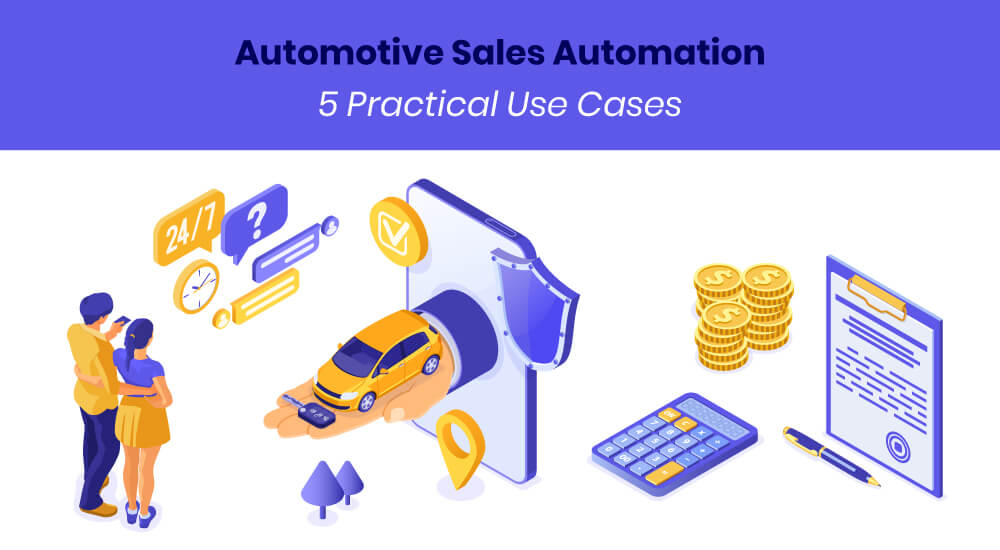
Another aspect to look at is, since the onset of the Covid-19 pandemic, consumers are using online channels more than ever to interact with businesses in almost all industries.
However, according to McKinsey, automotive players were uncertain about using digital channels before the crisis. But now that remote selling models are becoming the new normal, even the automotive businesses have realized the need to automate their sales processes.
The concept of automation in automotive sales is not new, in fact. For instance, Caravana lets buyers research, purchase, and finance a car on the company website. Moreover, buyers can choose to pick the car from the car vending machine or ask to have it delivered.
The point is – to efficiently serve the growing number of consumers and bring efficiency in their operations, dealers must automate their core processes.
In this article, we will discuss automotive sales automation use cases across the car dealership business. We will also see how automation can help car dealers accelerate sales.
Automotive sales automation: 5 use cases
If we look at a day in the car dealership business, it involves checking invoices, talking to prospects/customers, negotiating deals, and managing their salesforce. Also, a large part of this business comprises of routine maintenance of vehicles sold. Unfortunately, companies still handle all these tasks manually – mostly through paper-based documents/registers and spreadsheets. This approach will not sustain itself in the long run, especially when one wants to scale.
Here’s how automotive sales automation can streamline everyday activities.
#1 Data-driven automation in marketing and sales processes
Traditionally, car dealers used to organize tent sale to make buyers aware of their new business. After their business caught momentum, local advertisements and referrals become the primary source of acquiring new customers. Irrespective of how dealers acquire customers, closing deals require strong sales and interpersonal skills. However, it is possible to amplify sales through smart automation and equipping sales reps with relevant customer information.
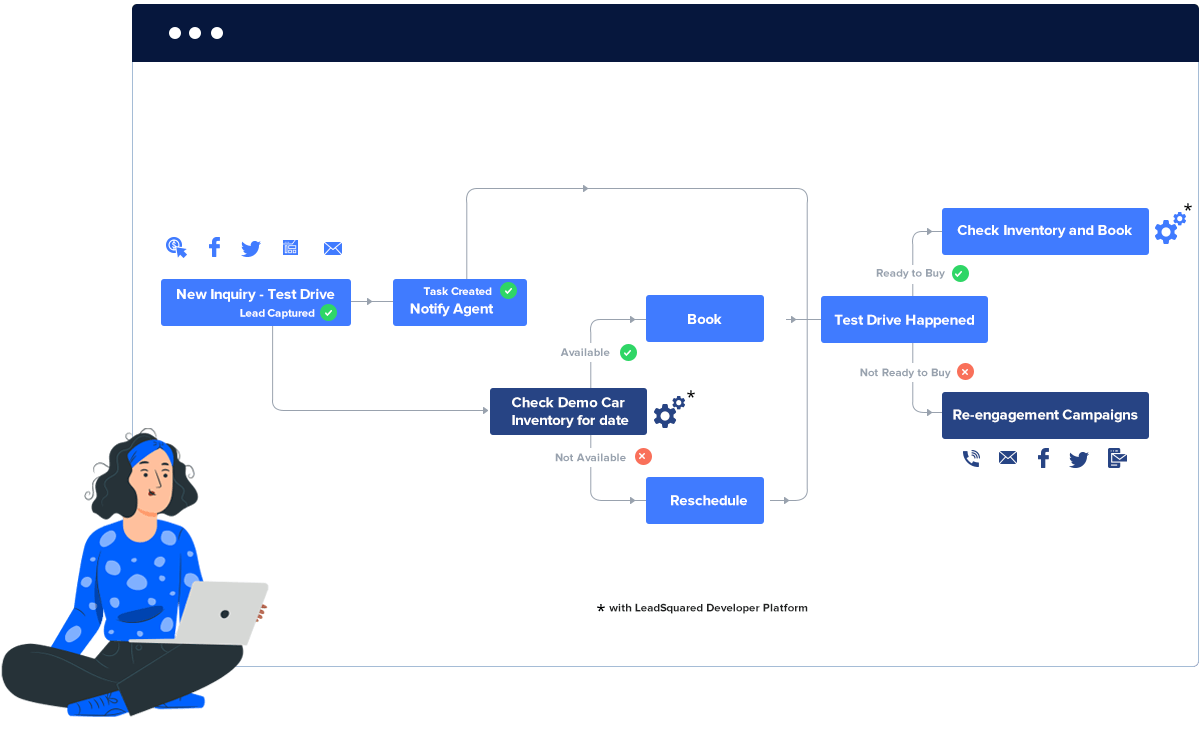
For instance, Walser Automotive Group uses marketing automation that picks up data from their CRM system to craft messages and offers based on the customer’s unique buying stage and interests.
Typically, dealers use a shotgun approach of getting generic info out to as many people as possible. But Walser uses targeted messages relevant to the customer within their purchase lifecycle and based on their online behavior. Their targeted campaigns have resulted in over 20% CTRs (click-through rates), which is much higher than the industry average of 1.2%.
Let us look at how automation helps in streamlining automotive sales and marketing activities:
- You can track end-to-end vehicle buyer journey
- Capture all your interactions with your vehicle buyers
- Segment leads and automate engagement campaigns
- Based on their interactions on your website/ads, identify the cross-sell and upsell opportunities
- Track campaigns and performances of your salespeople
“We wanted to make the whole sales process easier for our reps and the customer. A lot of these activities – sending/receiving forms, payment reminders, and some parts of follow-ups – could be easily automated with a robust system. Therefore, we needed a complete sales and marketing automation tool, and so we went ahead with LeadSquared Dealership CRM.”
Anthony Lopez, Managing Partner, DSR Leasing
#2 Automate maintenance reminders
Generating recurring revenue streams is apparent to automotive business growth. There are several ways to go about it (for instance, on-demand mobility, ridesharing, etc.). However, revenues from repair and maintenance are crucial for dealers.
Imagine a situation when your customers turn to your competitor during the instances of emergencies. It will be a loss for your business. So, you would want to remind your customers about car maintenance in advance to prevent breakdowns and further hassle. It will ensure your business with your customer and, at the same time, present a positive experience to your customer.
Now, pulling the service history data and sending appropriate reminders from time to time can be tedious, and there are fair chances to miss a record.
Alternatively, you can create automated workflows for reminders on your automotive CRM software and send personalized emails/SMS/WhatsApp messages to customers whose servicing date is approaching.
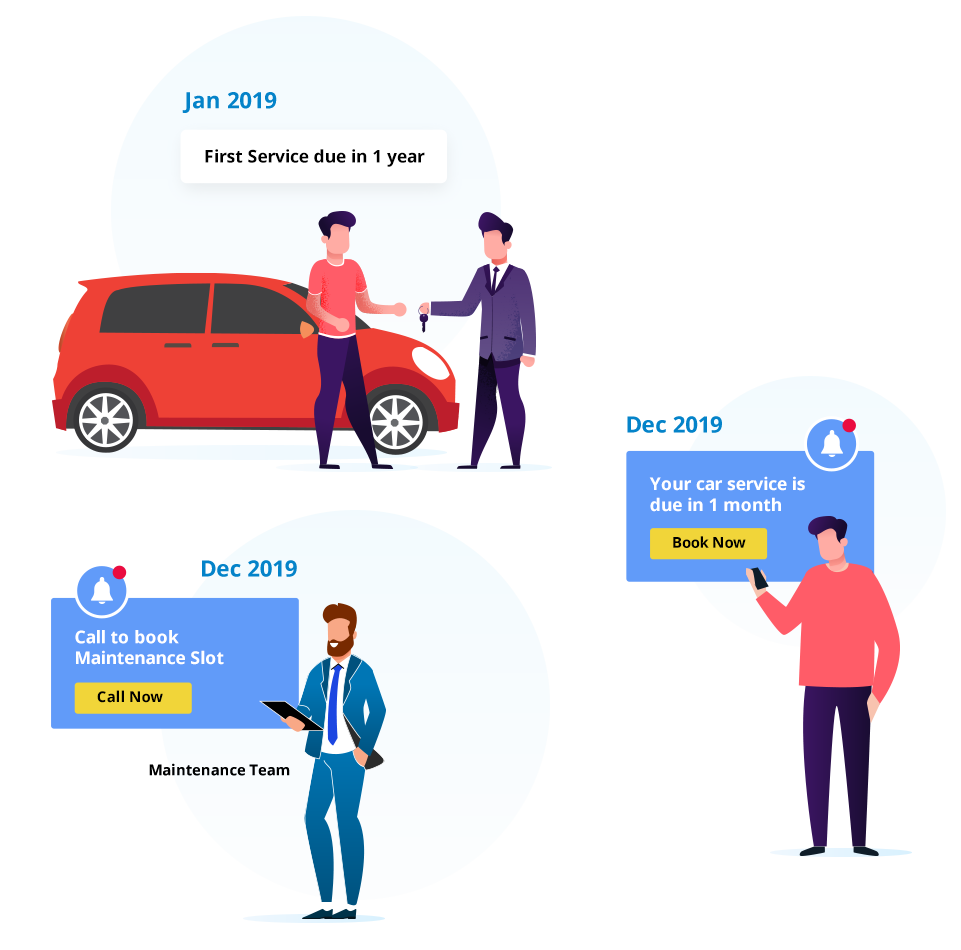
#3 Lead and customer relationship management
While there can be several ways to acquire leads, managing them effectively to pull them down the sales funnel matters more.
Automotive CRM software automates the entire sales process efficiently – from the time you capture a lead to the time they become your customer and beyond. In general, a CRM software designed for the automotive industry helps in the following ways:
Lead capture automation:
It lets you capture leads from several different sources and track their journey. Usually, automotive dealers find leads from websites, PPC ad campaigns, social media, and referral networks/websites. The next step is to prevent lead leakage – that is, you do not miss follow-ups or communication with the prospective customer who has shown interest in your services.
List segmentation:
Now, not all leads will be interested in buying the same car or the same maintenance service. Based on their interests, location, and other relevant parameters, you can segment your leads and customers into different buckets. Such segmentation can help you send automated and personalized sales and marketing messages to them from time to time.
Lead scoring:
Based on the activities of a lead on your website, you can assign scores to them. It will help you identify the ones that are more likely to convert. For example, if a lead visits your finance options page, it indicates that they are not only interested in buying a car but also serious about it. This lead has a higher chance of a conversion. So, you can prioritize the sales interaction with this lead.
Lead prioritization and automated distribution:
You can assign priorities based on attributes like lead source, car type, service availability, age, household income, and more. It will help your salespeople to reach out to those prospects that are more likely to convert.
Based on their availability, you can automatically assign leads to the sales reps for follow-ups. It is especially beneficial if you are handling a multi-location business.
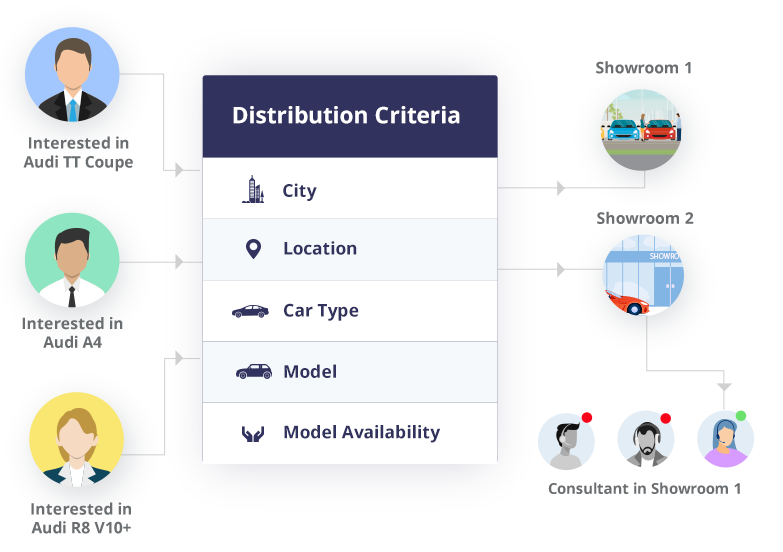
You can create an automated workflow for all these processes in your CRM software. Plus, CRM integration with auto dialers and cloud calling systems can reduce the hassle of manually calling a prospect and increase the efficiency of your sales reps. It will free them for more customer-facing tasks such as spending more time with customers and negotiating deals. Moreover, having a detailed customer information/interaction history can help your sales reps strike a meaningful conversation with them. Thus, building better relationships.
#4 Identify upsell and cross-sell opportunities
If we look at the automotive industry ecosystem, many other players have a considerable market share. For instance, insurance, used-car dealers, car accessory & parts dealers, to name some. While partnering with these stakeholders can benefit your business, influencing your customers to avail their services can bring you further profits.
However, the challenge remains – how to find out these opportunities. Well, CRM solutions with opportunity management help you identify such opportunities based on customer attributes and online behavior.
For example, GM Financial uses an integrated loan origination solution that can process user requests and perform transactions automatically. They also give users an option to select a dealership to make the process more spontaneous.
Inspired by this strategy, car Dealers can leverage automation for identifying cross-selling opportunities. They can also integrate their system with service providers to create a seamless experience for buyers.
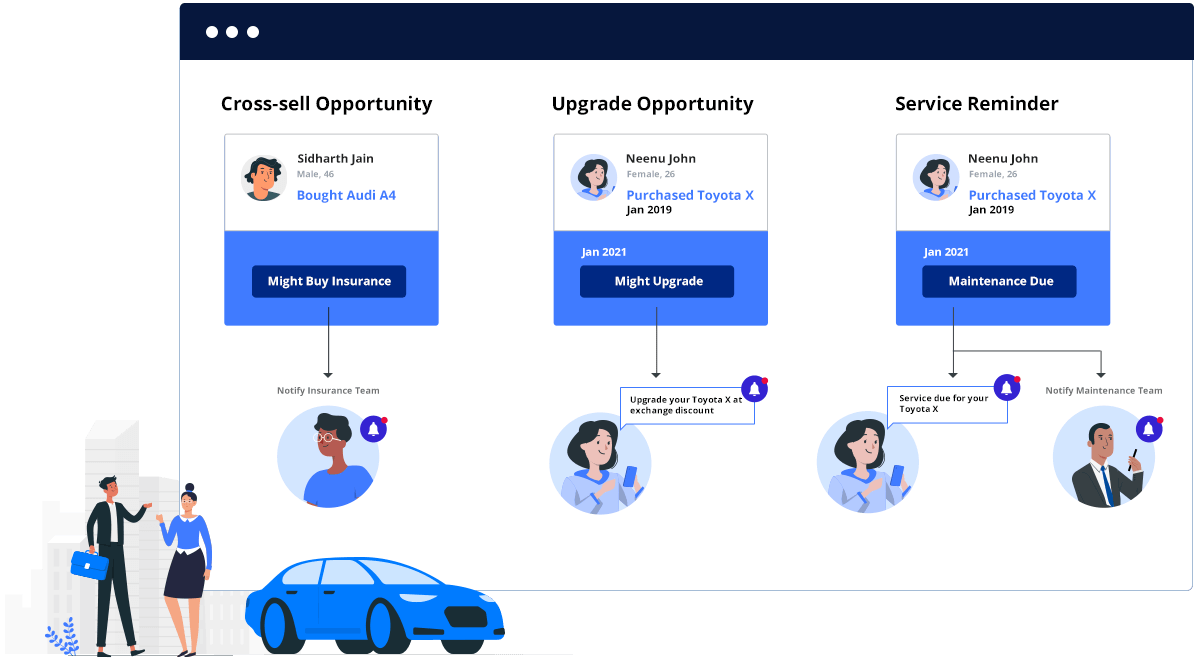
#5 Track the performance of your sales reps
Talking to the prospects/customers and negotiating deals are the routine activities of your salesforce. But the question is – are you getting the most out of your efforts? Are you tracking earned revenue, won and lost opportunities, the average time to close a deal, and lead engagement?
Such metrics directly impact your business growth. Therefore, you must track sales performances and suggest corrective measures if something is not right before it is too late.
Skimming the excel sheets will not help much. You need a robust system that automatically generates reports around your business KPIs over a specified period. Thankfully, automotive CRM software can address this very challenge of the car dealers. It gives structured performance visibility at different levels, viz. showroom performance, campaign reports, and team/sales reps performance reports.
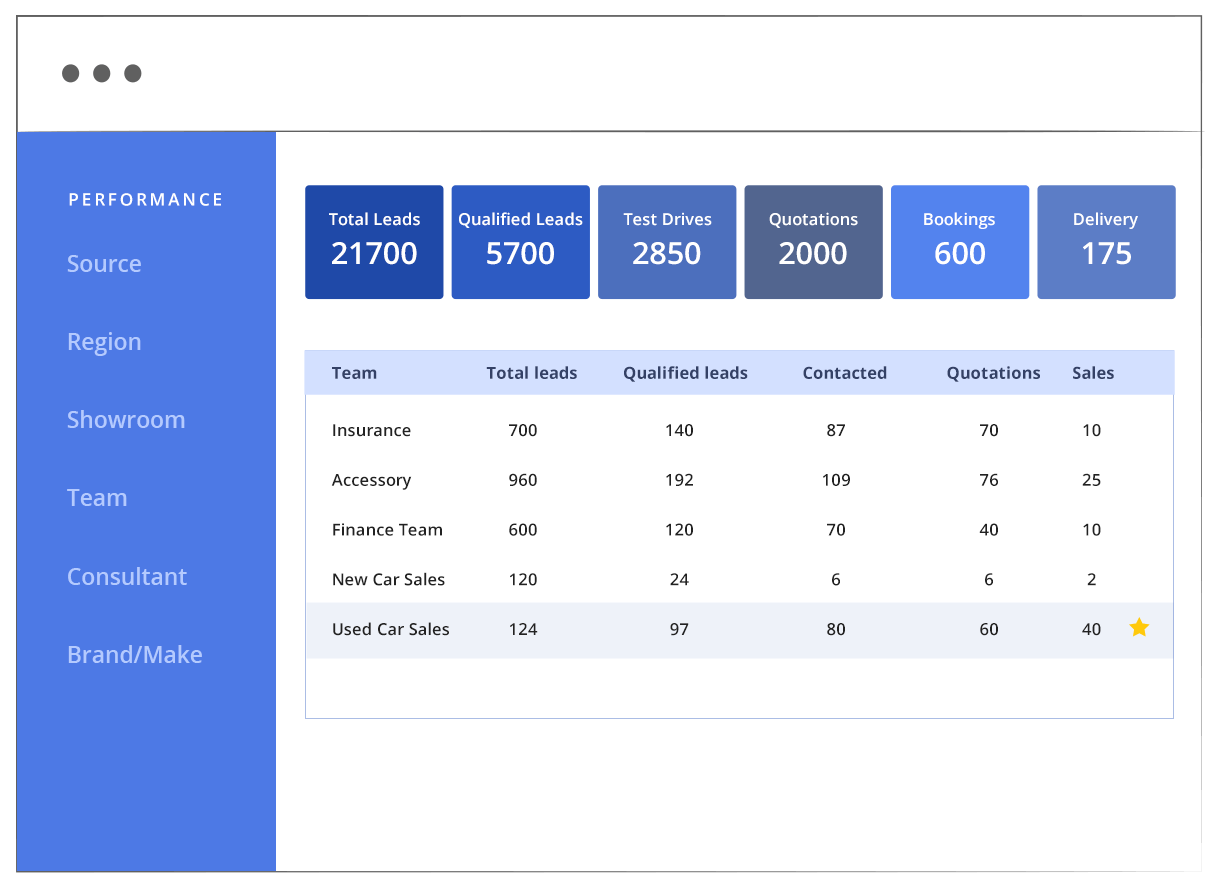
The bottom line
In February 2020, when the Covid-19 crisis struck China, their automotive sales declined by 80%. Meanwhile, a US electric vehicle maker reported a 10% increase in its sale in China. This company had already established online sales offerings, contactless test-drives, and home deliveries of cars that proved beneficial during the crisis.
The pandemic has disrupted the buying habits of consumers, in general. It has made both the demand side and supply side realize the convenience of using digital. Today, digital sales interactions have positive customer sentiments about twice that of traditional models. It indicates that the trend of online sales will continue.
Therefore, automotive players must embrace digitization across their operations. Digitization today will also open the avenues for the connected ecosystem of tomorrow. And needless to say, you can always benefit from the first-mover advantage.
To set your sales process into autopilot mode, how about starting with an automotive CRM? So, test drive LeadSquared CRM that has helped dealers like DSR Leasing streamline sales and speed up the customer acquisition process!






